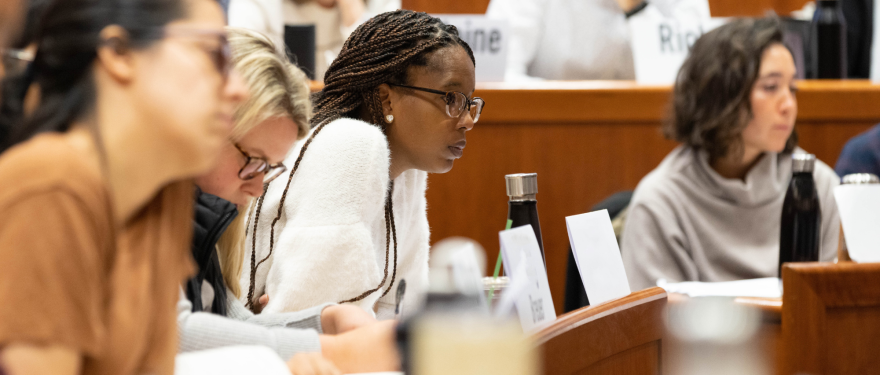Short Intensive Programs (SIPs) are courses that offer a great opportunity for students to think about career choices, gain practical skills, and explore new topics. These are no-fee, no-credit courses over winter break open to both first-year and second-year students.
We took a closer look at three programs: Accelerating Climate Solutions; Africa Rising: Understanding Business, Entrepreneurship, and the Complexities of a Continent; and Moving Beyond DTC (Direct to Consumer).
In Accelerating Climate Solutions, Professor Eleanor Laurans led the students in exploring how new ventures can create significant financial and societal value by accelerating greenhouse gas emission reductions. The course was designed for any student passionate about the role of business in combating climate change, and for students who may want to start, join or invest in new climate-related ventures.
The course began with a brief grounding in climate science and policy, before digging into the major verticals responsible for emissions: energy, buildings, transportation, food & agriculture, and materials & industrials. For each vertical, the students explored promising early progress (by either incumbents or start-ups) and the critical unsolved problems yet to be addressed.
The students did so with a mix of guest speakers, panels, case studies, articles, and a visit to Boston area climate facilities including Greentown Labs, a climate tech startup incubator. The course tapped into the experiences of leading investors and entrepreneurs, including Erik Snyder of the Drawdown Fund, Scott Jacobs of Generate and Rodi Guidero of Breakthrough Energy. The final phase of the SIP focused on common challenges faced by climate start-ups, such as balancing profit and impact, financing various stages of growth, measuring carbon reduction, and navigating the shifting policy and consumer landscape.
In Africa Rising: Understanding Business, Entrepreneurship, and the Complexities of a Continent, Professor Hakeem Belo-Osagie introduced HBS students to the complexities of Africa – economic, sociological, and historical – and the ways in which these Africa-specific trends impact the opportunities and challenges in undertaking business and entrepreneurship ventures on the continent today.
Drawing upon the active participation of prominent African alumni, as well as others with expertise in the field, Africa Rising offered a big picture understanding of the continent, and the ways in which its past informs the present. At the same time, the course took deep, vertical looks at both the differences and nuances that render Africa unique in today's emerging market landscape, and the similarities that can be drawn from other regions of the Global South and beyond. Africa Rising was crafted to appeal to students who have extensive experience working in Africa and those eager to expand their knowledge.
The course was purposefully designed to leverage student and alumni/expert participation with its format that included live cases, simulations, and Ted-style talks. Course themes included, among others, resilience; long time frames; diversification; leadership; formal and informal structures of power; technology; infrastructure; staffing, personnel, and management.
In Moving Beyond DTC, HBS Professors Ayelet Israeli and Len Schlesinger joined forces with Matt Higgins and an extraordinary lineup of speakers, to focus on delivering real-world perspectives that enable and empower students to build, operate and scale successful DTC businesses into the future.
The future of DTC is happening now. Decades of innovation, pre-existing trends and consumer evolution have been accelerated by a digital movement that was proliferated by COVID-19. However, some of the favorable market trends have changed in recent months. This year, Moving Beyond DTC examined the new challenges that DTC businesses face and the unique strategies that founders have adopted to stay relevant in the wake of the global pandemic and shifting consumer and investor preferences – from reinvesting in retail, introducing new channels, optimizing delivery and last mile logistics, exploring emerging interactive digital channels such as TikTok and the metaverse, and building an approachable brand centered around community.
“The sole purpose of our SIP is to leave everybody who comes into it with the opportunity to understand what it will take for them to create a brand and what it will take for them to grow a brand,” said Professor Israeli.

